Dental Interns Perceptions on Clinical Supervision
VerifiedAdded on 2023/06/04
|14
|4263
|378
AI Summary
The perception of the dental interns about the process of clinical supervision during their internship in academic life is mainly guided by their past experience of clinical supervision and the behaviour of their clinical supervisors. It is important for clinical supervisors to have good communication skills, motivation to teach, active listening, proper supervision, and serve as a role model.
Contribute Materials
Your contribution can guide someone’s learning journey. Share your
documents today.

Running head: MEDICINE AND HEALTH
Dental interns perceptions on clinical supervision
Name of the Student
Name of the University
Author Note
Dental interns perceptions on clinical supervision
Name of the Student
Name of the University
Author Note
Secure Best Marks with AI Grader
Need help grading? Try our AI Grader for instant feedback on your assignments.
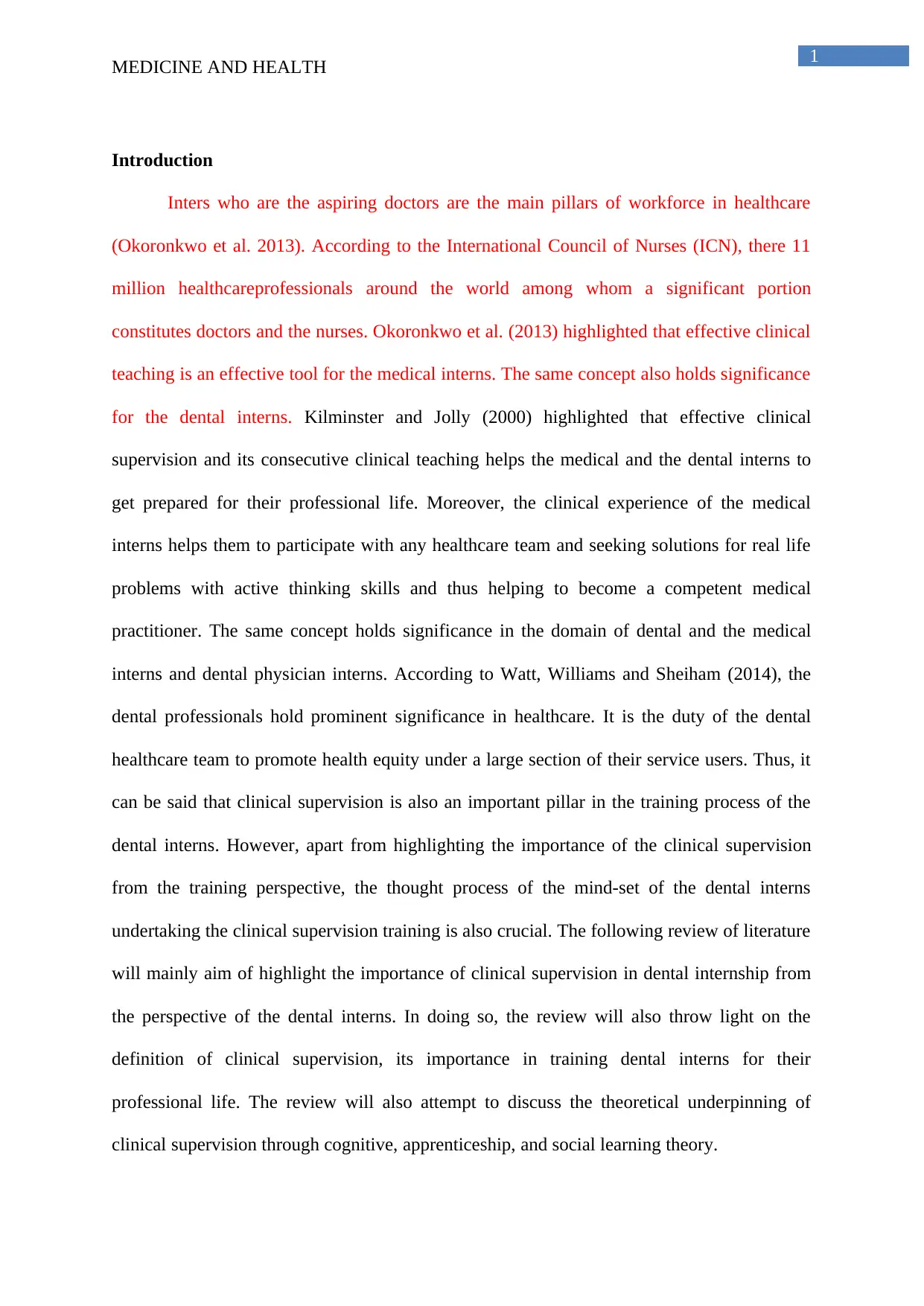
1
MEDICINE AND HEALTH
Introduction
Inters who are the aspiring doctors are the main pillars of workforce in healthcare
(Okoronkwo et al. 2013). According to the International Council of Nurses (ICN), there 11
million healthcareprofessionals around the world among whom a significant portion
constitutes doctors and the nurses. Okoronkwo et al. (2013) highlighted that effective clinical
teaching is an effective tool for the medical interns. The same concept also holds significance
for the dental interns. Kilminster and Jolly (2000) highlighted that effective clinical
supervision and its consecutive clinical teaching helps the medical and the dental interns to
get prepared for their professional life. Moreover, the clinical experience of the medical
interns helps them to participate with any healthcare team and seeking solutions for real life
problems with active thinking skills and thus helping to become a competent medical
practitioner. The same concept holds significance in the domain of dental and the medical
interns and dental physician interns. According to Watt, Williams and Sheiham (2014), the
dental professionals hold prominent significance in healthcare. It is the duty of the dental
healthcare team to promote health equity under a large section of their service users. Thus, it
can be said that clinical supervision is also an important pillar in the training process of the
dental interns. However, apart from highlighting the importance of the clinical supervision
from the training perspective, the thought process of the mind-set of the dental interns
undertaking the clinical supervision training is also crucial. The following review of literature
will mainly aim of highlight the importance of clinical supervision in dental internship from
the perspective of the dental interns. In doing so, the review will also throw light on the
definition of clinical supervision, its importance in training dental interns for their
professional life. The review will also attempt to discuss the theoretical underpinning of
clinical supervision through cognitive, apprenticeship, and social learning theory.
MEDICINE AND HEALTH
Introduction
Inters who are the aspiring doctors are the main pillars of workforce in healthcare
(Okoronkwo et al. 2013). According to the International Council of Nurses (ICN), there 11
million healthcareprofessionals around the world among whom a significant portion
constitutes doctors and the nurses. Okoronkwo et al. (2013) highlighted that effective clinical
teaching is an effective tool for the medical interns. The same concept also holds significance
for the dental interns. Kilminster and Jolly (2000) highlighted that effective clinical
supervision and its consecutive clinical teaching helps the medical and the dental interns to
get prepared for their professional life. Moreover, the clinical experience of the medical
interns helps them to participate with any healthcare team and seeking solutions for real life
problems with active thinking skills and thus helping to become a competent medical
practitioner. The same concept holds significance in the domain of dental and the medical
interns and dental physician interns. According to Watt, Williams and Sheiham (2014), the
dental professionals hold prominent significance in healthcare. It is the duty of the dental
healthcare team to promote health equity under a large section of their service users. Thus, it
can be said that clinical supervision is also an important pillar in the training process of the
dental interns. However, apart from highlighting the importance of the clinical supervision
from the training perspective, the thought process of the mind-set of the dental interns
undertaking the clinical supervision training is also crucial. The following review of literature
will mainly aim of highlight the importance of clinical supervision in dental internship from
the perspective of the dental interns. In doing so, the review will also throw light on the
definition of clinical supervision, its importance in training dental interns for their
professional life. The review will also attempt to discuss the theoretical underpinning of
clinical supervision through cognitive, apprenticeship, and social learning theory.
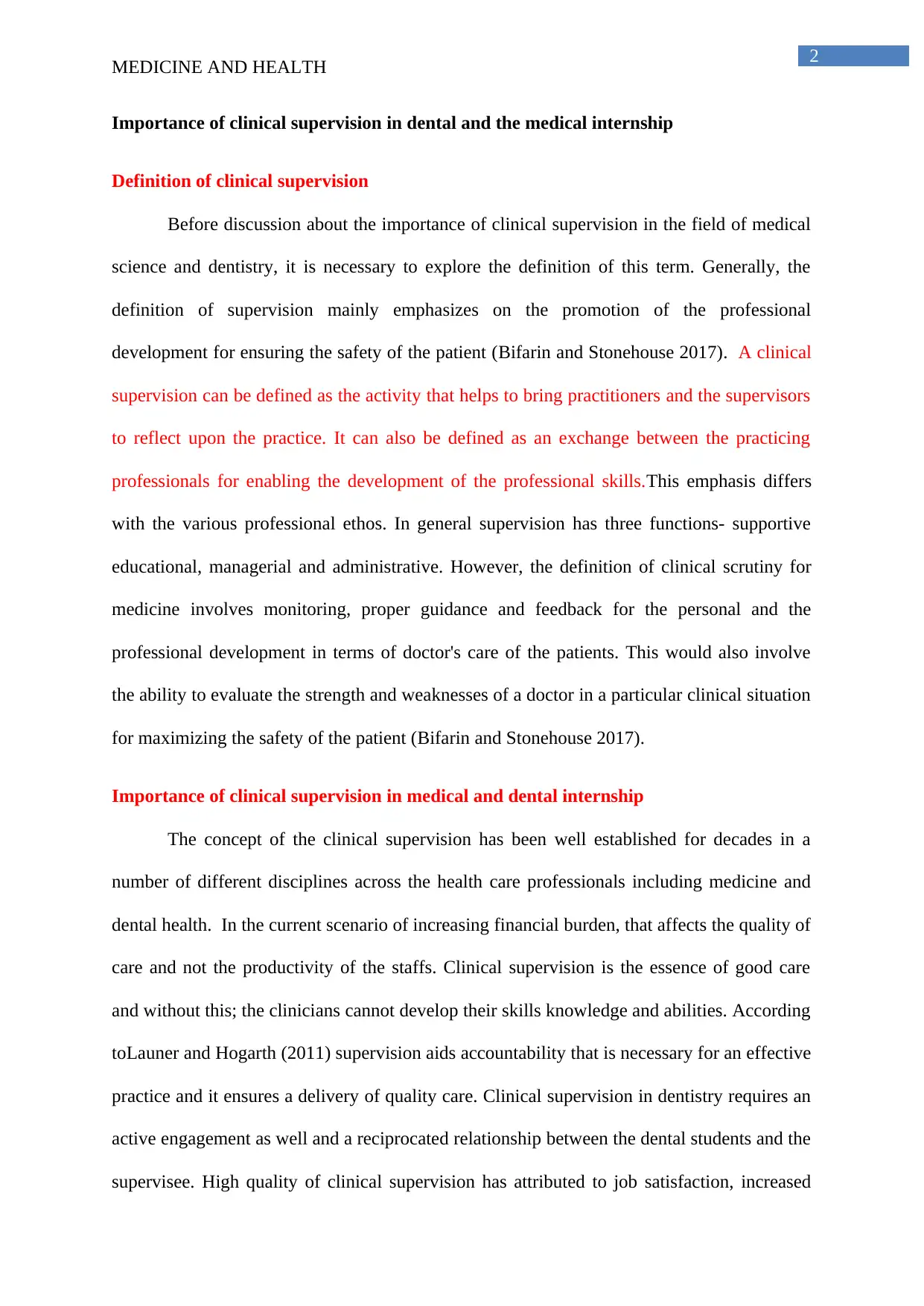
2
MEDICINE AND HEALTH
Importance of clinical supervision in dental and the medical internship
Definition of clinical supervision
Before discussion about the importance of clinical supervision in the field of medical
science and dentistry, it is necessary to explore the definition of this term. Generally, the
definition of supervision mainly emphasizes on the promotion of the professional
development for ensuring the safety of the patient (Bifarin and Stonehouse 2017). A clinical
supervision can be defined as the activity that helps to bring practitioners and the supervisors
to reflect upon the practice. It can also be defined as an exchange between the practicing
professionals for enabling the development of the professional skills.This emphasis differs
with the various professional ethos. In general supervision has three functions- supportive
educational, managerial and administrative. However, the definition of clinical scrutiny for
medicine involves monitoring, proper guidance and feedback for the personal and the
professional development in terms of doctor's care of the patients. This would also involve
the ability to evaluate the strength and weaknesses of a doctor in a particular clinical situation
for maximizing the safety of the patient (Bifarin and Stonehouse 2017).
Importance of clinical supervision in medical and dental internship
The concept of the clinical supervision has been well established for decades in a
number of different disciplines across the health care professionals including medicine and
dental health. In the current scenario of increasing financial burden, that affects the quality of
care and not the productivity of the staffs. Clinical supervision is the essence of good care
and without this; the clinicians cannot develop their skills knowledge and abilities. According
toLauner and Hogarth (2011) supervision aids accountability that is necessary for an effective
practice and it ensures a delivery of quality care. Clinical supervision in dentistry requires an
active engagement as well and a reciprocated relationship between the dental students and the
supervisee. High quality of clinical supervision has attributed to job satisfaction, increased
MEDICINE AND HEALTH
Importance of clinical supervision in dental and the medical internship
Definition of clinical supervision
Before discussion about the importance of clinical supervision in the field of medical
science and dentistry, it is necessary to explore the definition of this term. Generally, the
definition of supervision mainly emphasizes on the promotion of the professional
development for ensuring the safety of the patient (Bifarin and Stonehouse 2017). A clinical
supervision can be defined as the activity that helps to bring practitioners and the supervisors
to reflect upon the practice. It can also be defined as an exchange between the practicing
professionals for enabling the development of the professional skills.This emphasis differs
with the various professional ethos. In general supervision has three functions- supportive
educational, managerial and administrative. However, the definition of clinical scrutiny for
medicine involves monitoring, proper guidance and feedback for the personal and the
professional development in terms of doctor's care of the patients. This would also involve
the ability to evaluate the strength and weaknesses of a doctor in a particular clinical situation
for maximizing the safety of the patient (Bifarin and Stonehouse 2017).
Importance of clinical supervision in medical and dental internship
The concept of the clinical supervision has been well established for decades in a
number of different disciplines across the health care professionals including medicine and
dental health. In the current scenario of increasing financial burden, that affects the quality of
care and not the productivity of the staffs. Clinical supervision is the essence of good care
and without this; the clinicians cannot develop their skills knowledge and abilities. According
toLauner and Hogarth (2011) supervision aids accountability that is necessary for an effective
practice and it ensures a delivery of quality care. Clinical supervision in dentistry requires an
active engagement as well and a reciprocated relationship between the dental students and the
supervisee. High quality of clinical supervision has attributed to job satisfaction, increased
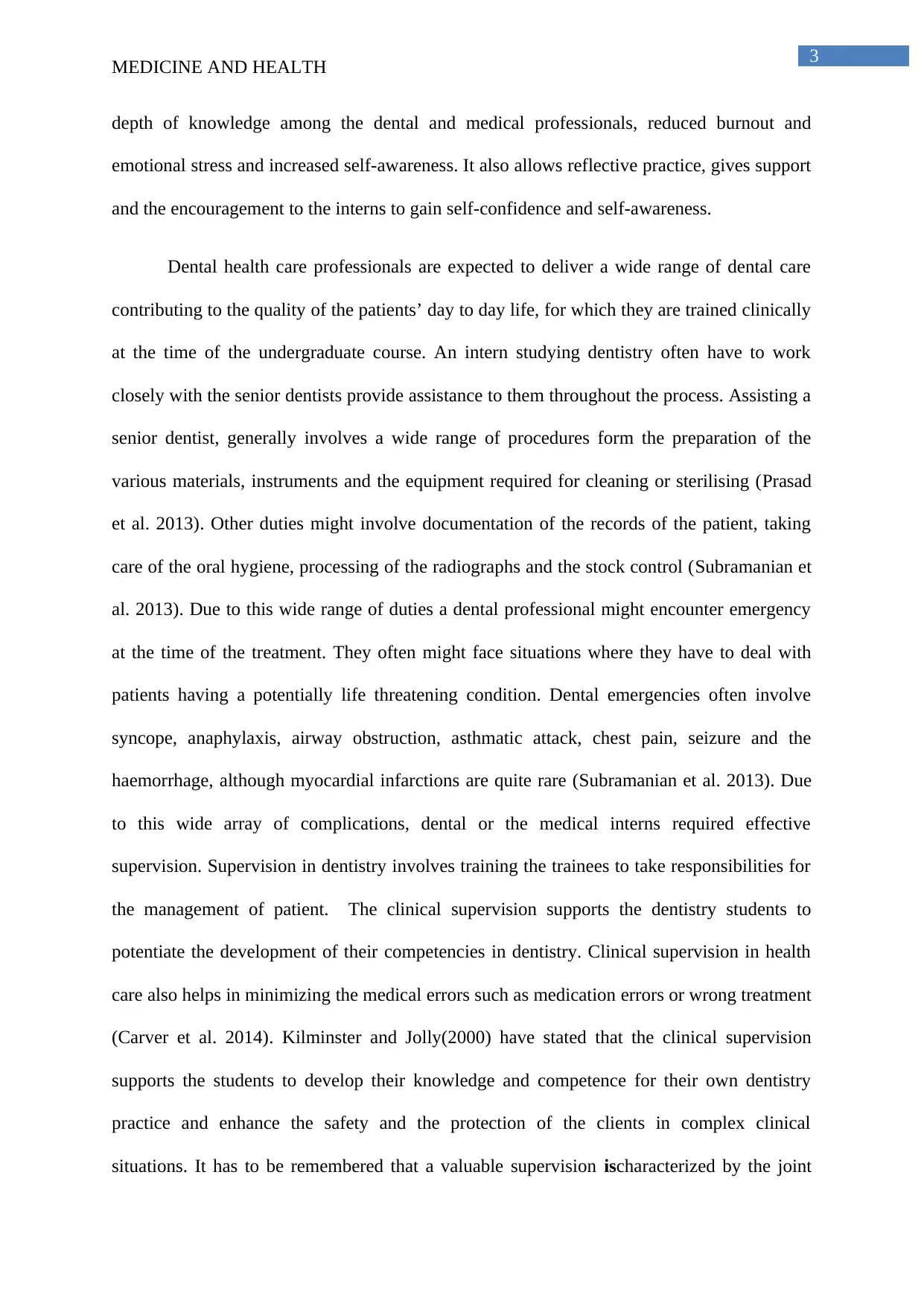
3
MEDICINE AND HEALTH
depth of knowledge among the dental and medical professionals, reduced burnout and
emotional stress and increased self-awareness. It also allows reflective practice, gives support
and the encouragement to the interns to gain self-confidence and self-awareness.
Dental health care professionals are expected to deliver a wide range of dental care
contributing to the quality of the patients’ day to day life, for which they are trained clinically
at the time of the undergraduate course. An intern studying dentistry often have to work
closely with the senior dentists provide assistance to them throughout the process. Assisting a
senior dentist, generally involves a wide range of procedures form the preparation of the
various materials, instruments and the equipment required for cleaning or sterilising (Prasad
et al. 2013). Other duties might involve documentation of the records of the patient, taking
care of the oral hygiene, processing of the radiographs and the stock control (Subramanian et
al. 2013). Due to this wide range of duties a dental professional might encounter emergency
at the time of the treatment. They often might face situations where they have to deal with
patients having a potentially life threatening condition. Dental emergencies often involve
syncope, anaphylaxis, airway obstruction, asthmatic attack, chest pain, seizure and the
haemorrhage, although myocardial infarctions are quite rare (Subramanian et al. 2013). Due
to this wide array of complications, dental or the medical interns required effective
supervision. Supervision in dentistry involves training the trainees to take responsibilities for
the management of patient. The clinical supervision supports the dentistry students to
potentiate the development of their competencies in dentistry. Clinical supervision in health
care also helps in minimizing the medical errors such as medication errors or wrong treatment
(Carver et al. 2014). Kilminster and Jolly(2000) have stated that the clinical supervision
supports the students to develop their knowledge and competence for their own dentistry
practice and enhance the safety and the protection of the clients in complex clinical
situations. It has to be remembered that a valuable supervision ischaracterized by the joint
MEDICINE AND HEALTH
depth of knowledge among the dental and medical professionals, reduced burnout and
emotional stress and increased self-awareness. It also allows reflective practice, gives support
and the encouragement to the interns to gain self-confidence and self-awareness.
Dental health care professionals are expected to deliver a wide range of dental care
contributing to the quality of the patients’ day to day life, for which they are trained clinically
at the time of the undergraduate course. An intern studying dentistry often have to work
closely with the senior dentists provide assistance to them throughout the process. Assisting a
senior dentist, generally involves a wide range of procedures form the preparation of the
various materials, instruments and the equipment required for cleaning or sterilising (Prasad
et al. 2013). Other duties might involve documentation of the records of the patient, taking
care of the oral hygiene, processing of the radiographs and the stock control (Subramanian et
al. 2013). Due to this wide range of duties a dental professional might encounter emergency
at the time of the treatment. They often might face situations where they have to deal with
patients having a potentially life threatening condition. Dental emergencies often involve
syncope, anaphylaxis, airway obstruction, asthmatic attack, chest pain, seizure and the
haemorrhage, although myocardial infarctions are quite rare (Subramanian et al. 2013). Due
to this wide array of complications, dental or the medical interns required effective
supervision. Supervision in dentistry involves training the trainees to take responsibilities for
the management of patient. The clinical supervision supports the dentistry students to
potentiate the development of their competencies in dentistry. Clinical supervision in health
care also helps in minimizing the medical errors such as medication errors or wrong treatment
(Carver et al. 2014). Kilminster and Jolly(2000) have stated that the clinical supervision
supports the students to develop their knowledge and competence for their own dentistry
practice and enhance the safety and the protection of the clients in complex clinical
situations. It has to be remembered that a valuable supervision ischaracterized by the joint
Secure Best Marks with AI Grader
Need help grading? Try our AI Grader for instant feedback on your assignments.
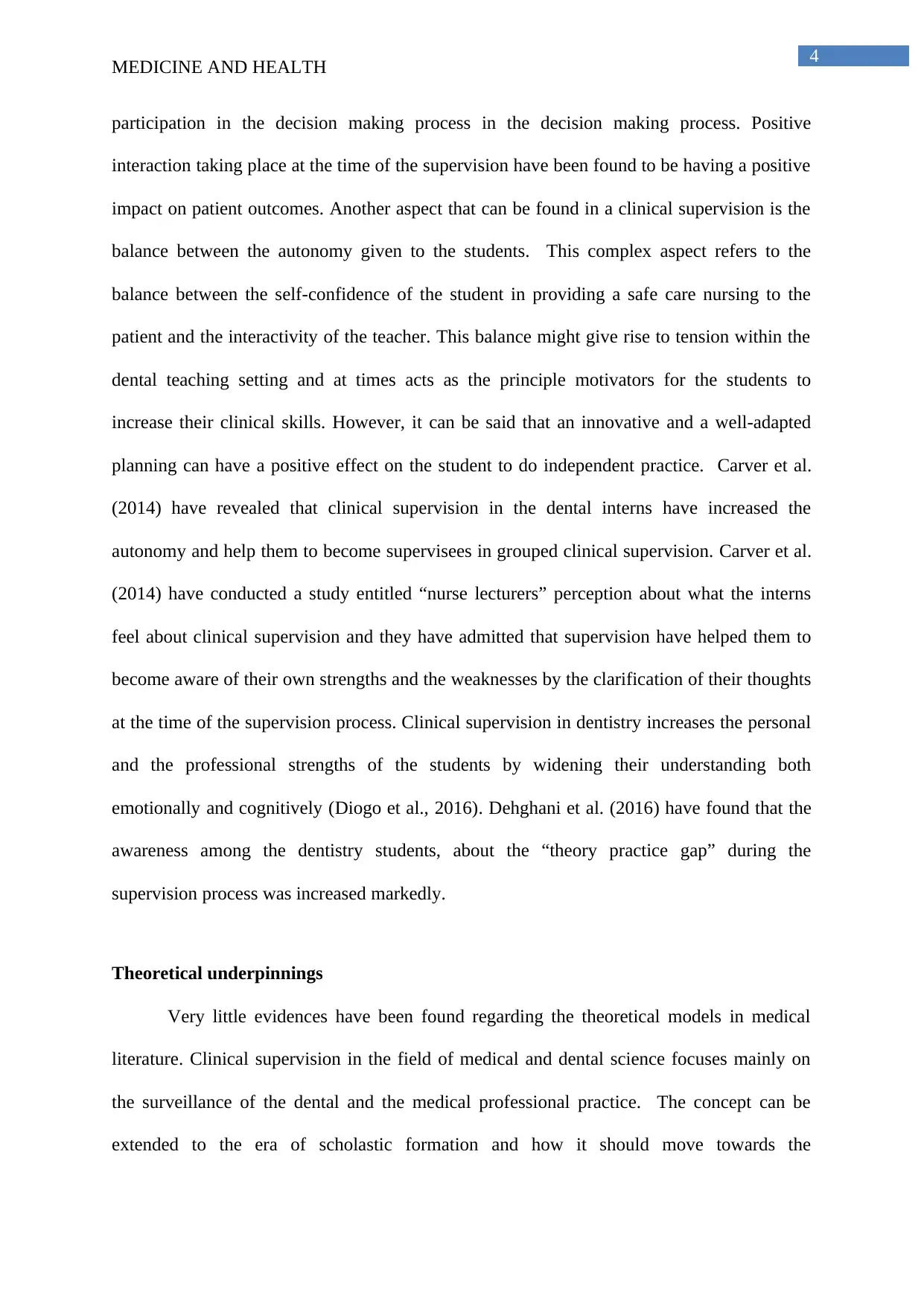
4
MEDICINE AND HEALTH
participation in the decision making process in the decision making process. Positive
interaction taking place at the time of the supervision have been found to be having a positive
impact on patient outcomes. Another aspect that can be found in a clinical supervision is the
balance between the autonomy given to the students. This complex aspect refers to the
balance between the self-confidence of the student in providing a safe care nursing to the
patient and the interactivity of the teacher. This balance might give rise to tension within the
dental teaching setting and at times acts as the principle motivators for the students to
increase their clinical skills. However, it can be said that an innovative and a well-adapted
planning can have a positive effect on the student to do independent practice. Carver et al.
(2014) have revealed that clinical supervision in the dental interns have increased the
autonomy and help them to become supervisees in grouped clinical supervision. Carver et al.
(2014) have conducted a study entitled “nurse lecturers” perception about what the interns
feel about clinical supervision and they have admitted that supervision have helped them to
become aware of their own strengths and the weaknesses by the clarification of their thoughts
at the time of the supervision process. Clinical supervision in dentistry increases the personal
and the professional strengths of the students by widening their understanding both
emotionally and cognitively (Diogo et al., 2016). Dehghani et al. (2016) have found that the
awareness among the dentistry students, about the “theory practice gap” during the
supervision process was increased markedly.
Theoretical underpinnings
Very little evidences have been found regarding the theoretical models in medical
literature. Clinical supervision in the field of medical and dental science focuses mainly on
the surveillance of the dental and the medical professional practice. The concept can be
extended to the era of scholastic formation and how it should move towards the
MEDICINE AND HEALTH
participation in the decision making process in the decision making process. Positive
interaction taking place at the time of the supervision have been found to be having a positive
impact on patient outcomes. Another aspect that can be found in a clinical supervision is the
balance between the autonomy given to the students. This complex aspect refers to the
balance between the self-confidence of the student in providing a safe care nursing to the
patient and the interactivity of the teacher. This balance might give rise to tension within the
dental teaching setting and at times acts as the principle motivators for the students to
increase their clinical skills. However, it can be said that an innovative and a well-adapted
planning can have a positive effect on the student to do independent practice. Carver et al.
(2014) have revealed that clinical supervision in the dental interns have increased the
autonomy and help them to become supervisees in grouped clinical supervision. Carver et al.
(2014) have conducted a study entitled “nurse lecturers” perception about what the interns
feel about clinical supervision and they have admitted that supervision have helped them to
become aware of their own strengths and the weaknesses by the clarification of their thoughts
at the time of the supervision process. Clinical supervision in dentistry increases the personal
and the professional strengths of the students by widening their understanding both
emotionally and cognitively (Diogo et al., 2016). Dehghani et al. (2016) have found that the
awareness among the dentistry students, about the “theory practice gap” during the
supervision process was increased markedly.
Theoretical underpinnings
Very little evidences have been found regarding the theoretical models in medical
literature. Clinical supervision in the field of medical and dental science focuses mainly on
the surveillance of the dental and the medical professional practice. The concept can be
extended to the era of scholastic formation and how it should move towards the
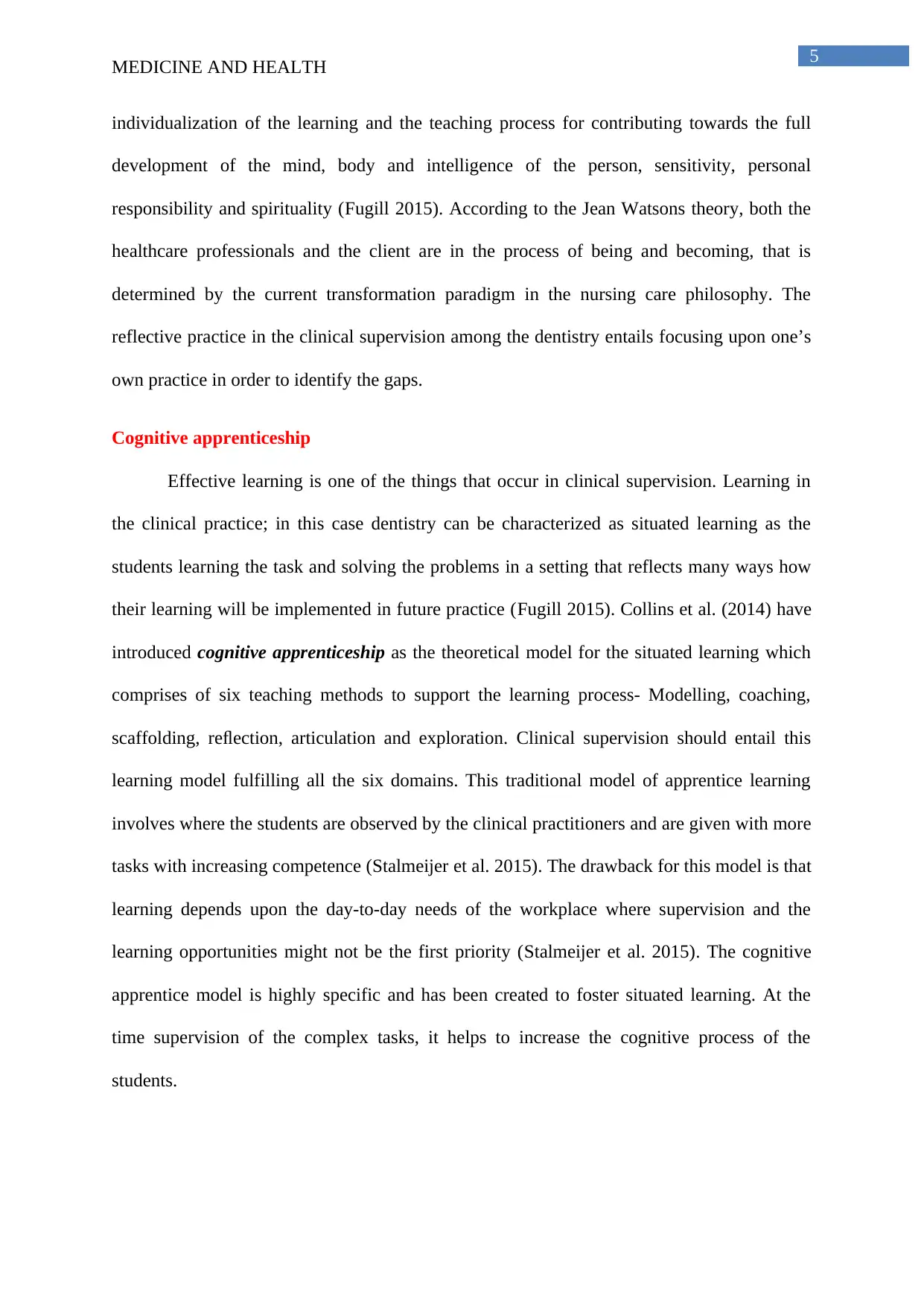
5
MEDICINE AND HEALTH
individualization of the learning and the teaching process for contributing towards the full
development of the mind, body and intelligence of the person, sensitivity, personal
responsibility and spirituality (Fugill 2015). According to the Jean Watsons theory, both the
healthcare professionals and the client are in the process of being and becoming, that is
determined by the current transformation paradigm in the nursing care philosophy. The
reflective practice in the clinical supervision among the dentistry entails focusing upon one’s
own practice in order to identify the gaps.
Cognitive apprenticeship
Effective learning is one of the things that occur in clinical supervision. Learning in
the clinical practice; in this case dentistry can be characterized as situated learning as the
students learning the task and solving the problems in a setting that reflects many ways how
their learning will be implemented in future practice (Fugill 2015). Collins et al. (2014) have
introduced cognitive apprenticeship as the theoretical model for the situated learning which
comprises of six teaching methods to support the learning process- Modelling, coaching,
scaffolding, reflection, articulation and exploration. Clinical supervision should entail this
learning model fulfilling all the six domains. This traditional model of apprentice learning
involves where the students are observed by the clinical practitioners and are given with more
tasks with increasing competence (Stalmeijer et al. 2015). The drawback for this model is that
learning depends upon the day-to-day needs of the workplace where supervision and the
learning opportunities might not be the first priority (Stalmeijer et al. 2015). The cognitive
apprentice model is highly specific and has been created to foster situated learning. At the
time supervision of the complex tasks, it helps to increase the cognitive process of the
students.
MEDICINE AND HEALTH
individualization of the learning and the teaching process for contributing towards the full
development of the mind, body and intelligence of the person, sensitivity, personal
responsibility and spirituality (Fugill 2015). According to the Jean Watsons theory, both the
healthcare professionals and the client are in the process of being and becoming, that is
determined by the current transformation paradigm in the nursing care philosophy. The
reflective practice in the clinical supervision among the dentistry entails focusing upon one’s
own practice in order to identify the gaps.
Cognitive apprenticeship
Effective learning is one of the things that occur in clinical supervision. Learning in
the clinical practice; in this case dentistry can be characterized as situated learning as the
students learning the task and solving the problems in a setting that reflects many ways how
their learning will be implemented in future practice (Fugill 2015). Collins et al. (2014) have
introduced cognitive apprenticeship as the theoretical model for the situated learning which
comprises of six teaching methods to support the learning process- Modelling, coaching,
scaffolding, reflection, articulation and exploration. Clinical supervision should entail this
learning model fulfilling all the six domains. This traditional model of apprentice learning
involves where the students are observed by the clinical practitioners and are given with more
tasks with increasing competence (Stalmeijer et al. 2015). The drawback for this model is that
learning depends upon the day-to-day needs of the workplace where supervision and the
learning opportunities might not be the first priority (Stalmeijer et al. 2015). The cognitive
apprentice model is highly specific and has been created to foster situated learning. At the
time supervision of the complex tasks, it helps to increase the cognitive process of the
students.
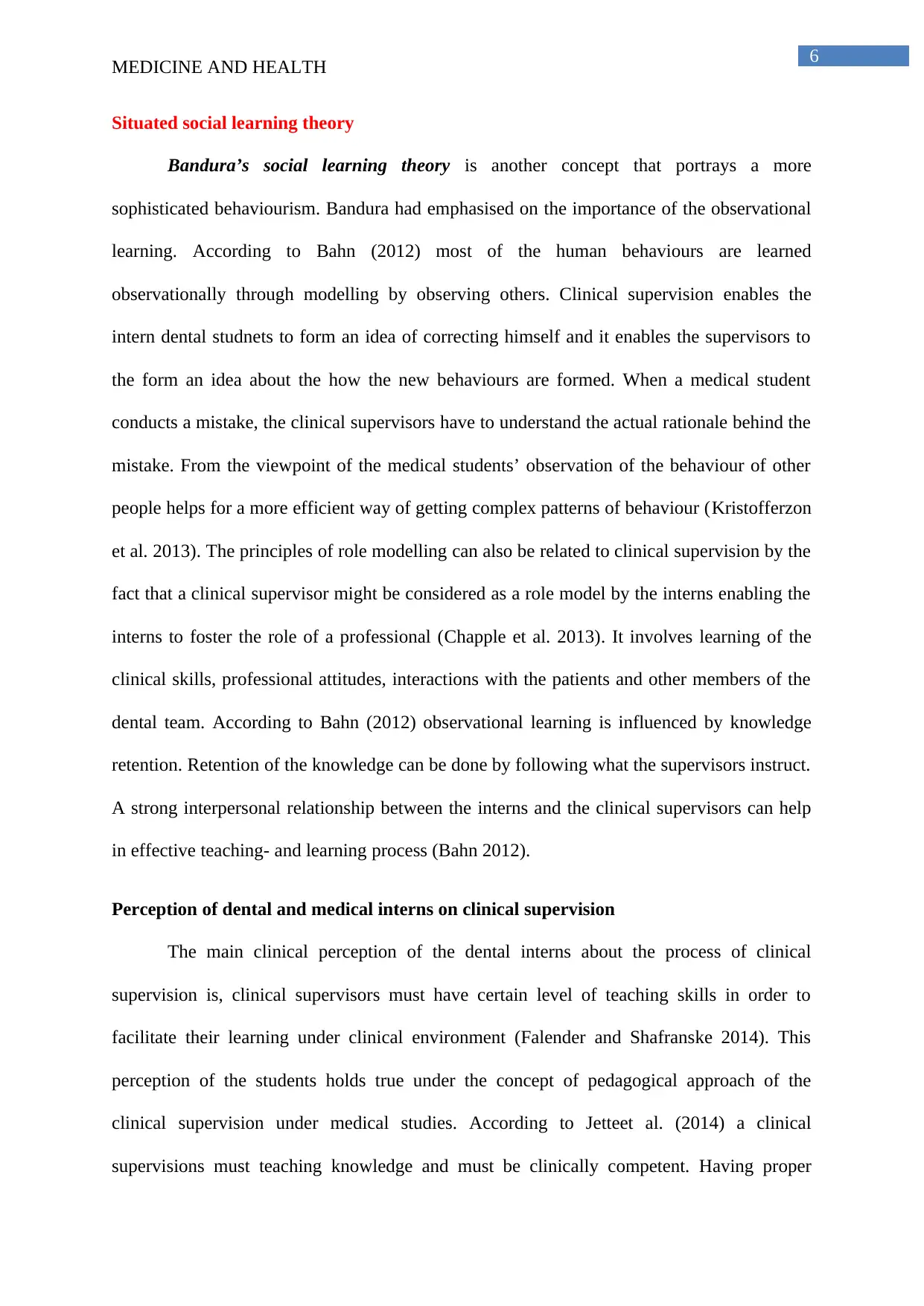
6
MEDICINE AND HEALTH
Situated social learning theory
Bandura’s social learning theory is another concept that portrays a more
sophisticated behaviourism. Bandura had emphasised on the importance of the observational
learning. According to Bahn (2012) most of the human behaviours are learned
observationally through modelling by observing others. Clinical supervision enables the
intern dental studnets to form an idea of correcting himself and it enables the supervisors to
the form an idea about the how the new behaviours are formed. When a medical student
conducts a mistake, the clinical supervisors have to understand the actual rationale behind the
mistake. From the viewpoint of the medical students’ observation of the behaviour of other
people helps for a more efficient way of getting complex patterns of behaviour (Kristofferzon
et al. 2013). The principles of role modelling can also be related to clinical supervision by the
fact that a clinical supervisor might be considered as a role model by the interns enabling the
interns to foster the role of a professional (Chapple et al. 2013). It involves learning of the
clinical skills, professional attitudes, interactions with the patients and other members of the
dental team. According to Bahn (2012) observational learning is influenced by knowledge
retention. Retention of the knowledge can be done by following what the supervisors instruct.
A strong interpersonal relationship between the interns and the clinical supervisors can help
in effective teaching- and learning process (Bahn 2012).
Perception of dental and medical interns on clinical supervision
The main clinical perception of the dental interns about the process of clinical
supervision is, clinical supervisors must have certain level of teaching skills in order to
facilitate their learning under clinical environment (Falender and Shafranske 2014). This
perception of the students holds true under the concept of pedagogical approach of the
clinical supervision under medical studies. According to Jetteet al. (2014) a clinical
supervisions must teaching knowledge and must be clinically competent. Having proper
MEDICINE AND HEALTH
Situated social learning theory
Bandura’s social learning theory is another concept that portrays a more
sophisticated behaviourism. Bandura had emphasised on the importance of the observational
learning. According to Bahn (2012) most of the human behaviours are learned
observationally through modelling by observing others. Clinical supervision enables the
intern dental studnets to form an idea of correcting himself and it enables the supervisors to
the form an idea about the how the new behaviours are formed. When a medical student
conducts a mistake, the clinical supervisors have to understand the actual rationale behind the
mistake. From the viewpoint of the medical students’ observation of the behaviour of other
people helps for a more efficient way of getting complex patterns of behaviour (Kristofferzon
et al. 2013). The principles of role modelling can also be related to clinical supervision by the
fact that a clinical supervisor might be considered as a role model by the interns enabling the
interns to foster the role of a professional (Chapple et al. 2013). It involves learning of the
clinical skills, professional attitudes, interactions with the patients and other members of the
dental team. According to Bahn (2012) observational learning is influenced by knowledge
retention. Retention of the knowledge can be done by following what the supervisors instruct.
A strong interpersonal relationship between the interns and the clinical supervisors can help
in effective teaching- and learning process (Bahn 2012).
Perception of dental and medical interns on clinical supervision
The main clinical perception of the dental interns about the process of clinical
supervision is, clinical supervisors must have certain level of teaching skills in order to
facilitate their learning under clinical environment (Falender and Shafranske 2014). This
perception of the students holds true under the concept of pedagogical approach of the
clinical supervision under medical studies. According to Jetteet al. (2014) a clinical
supervisions must teaching knowledge and must be clinically competent. Having proper
Paraphrase This Document
Need a fresh take? Get an instant paraphrase of this document with our AI Paraphraser
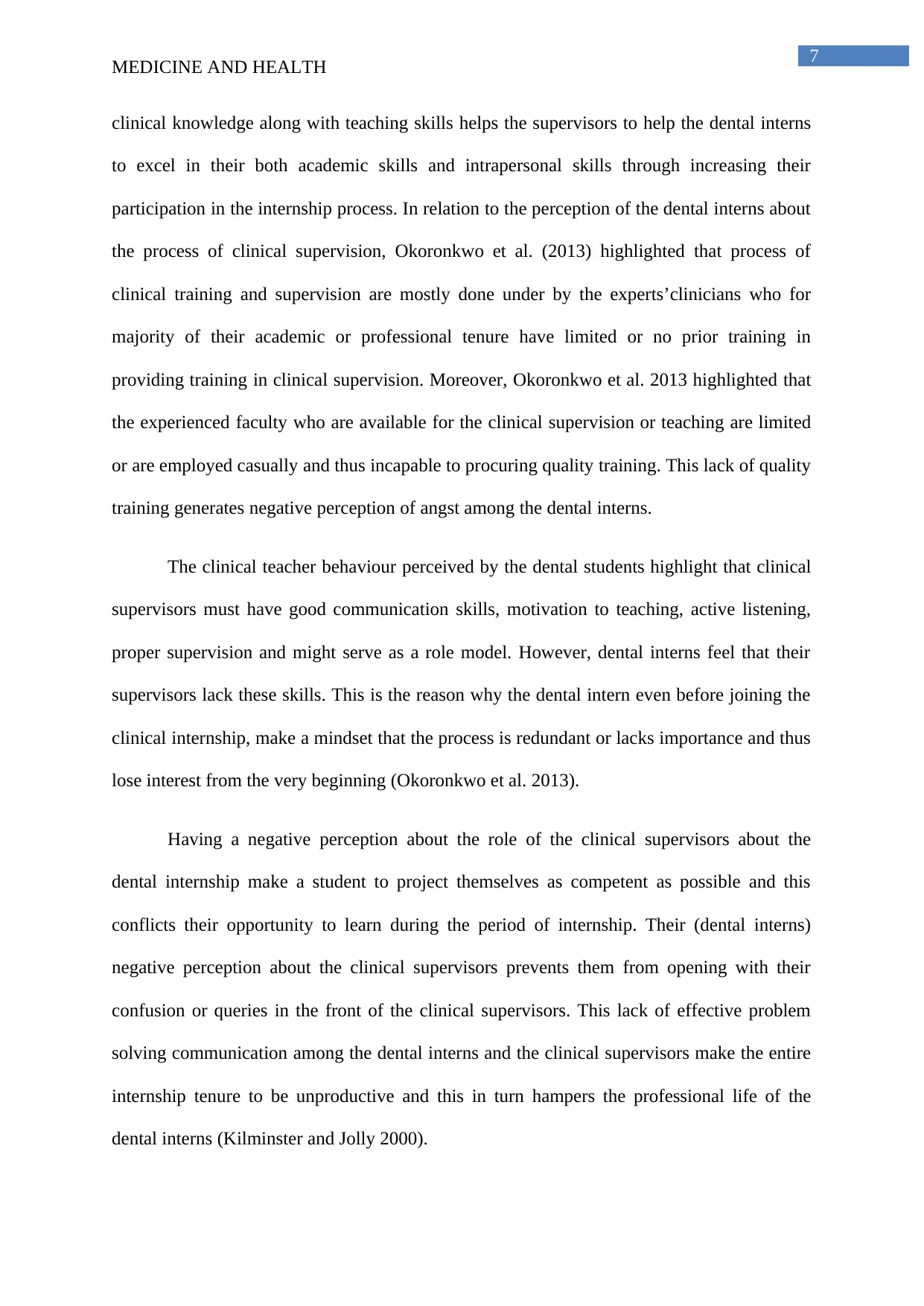
7
MEDICINE AND HEALTH
clinical knowledge along with teaching skills helps the supervisors to help the dental interns
to excel in their both academic skills and intrapersonal skills through increasing their
participation in the internship process. In relation to the perception of the dental interns about
the process of clinical supervision, Okoronkwo et al. (2013) highlighted that process of
clinical training and supervision are mostly done under by the experts’clinicians who for
majority of their academic or professional tenure have limited or no prior training in
providing training in clinical supervision. Moreover, Okoronkwo et al. 2013 highlighted that
the experienced faculty who are available for the clinical supervision or teaching are limited
or are employed casually and thus incapable to procuring quality training. This lack of quality
training generates negative perception of angst among the dental interns.
The clinical teacher behaviour perceived by the dental students highlight that clinical
supervisors must have good communication skills, motivation to teaching, active listening,
proper supervision and might serve as a role model. However, dental interns feel that their
supervisors lack these skills. This is the reason why the dental intern even before joining the
clinical internship, make a mindset that the process is redundant or lacks importance and thus
lose interest from the very beginning (Okoronkwo et al. 2013).
Having a negative perception about the role of the clinical supervisors about the
dental internship make a student to project themselves as competent as possible and this
conflicts their opportunity to learn during the period of internship. Their (dental interns)
negative perception about the clinical supervisors prevents them from opening with their
confusion or queries in the front of the clinical supervisors. This lack of effective problem
solving communication among the dental interns and the clinical supervisors make the entire
internship tenure to be unproductive and this in turn hampers the professional life of the
dental interns (Kilminster and Jolly 2000).
MEDICINE AND HEALTH
clinical knowledge along with teaching skills helps the supervisors to help the dental interns
to excel in their both academic skills and intrapersonal skills through increasing their
participation in the internship process. In relation to the perception of the dental interns about
the process of clinical supervision, Okoronkwo et al. (2013) highlighted that process of
clinical training and supervision are mostly done under by the experts’clinicians who for
majority of their academic or professional tenure have limited or no prior training in
providing training in clinical supervision. Moreover, Okoronkwo et al. 2013 highlighted that
the experienced faculty who are available for the clinical supervision or teaching are limited
or are employed casually and thus incapable to procuring quality training. This lack of quality
training generates negative perception of angst among the dental interns.
The clinical teacher behaviour perceived by the dental students highlight that clinical
supervisors must have good communication skills, motivation to teaching, active listening,
proper supervision and might serve as a role model. However, dental interns feel that their
supervisors lack these skills. This is the reason why the dental intern even before joining the
clinical internship, make a mindset that the process is redundant or lacks importance and thus
lose interest from the very beginning (Okoronkwo et al. 2013).
Having a negative perception about the role of the clinical supervisors about the
dental internship make a student to project themselves as competent as possible and this
conflicts their opportunity to learn during the period of internship. Their (dental interns)
negative perception about the clinical supervisors prevents them from opening with their
confusion or queries in the front of the clinical supervisors. This lack of effective problem
solving communication among the dental interns and the clinical supervisors make the entire
internship tenure to be unproductive and this in turn hampers the professional life of the
dental interns (Kilminster and Jolly 2000).
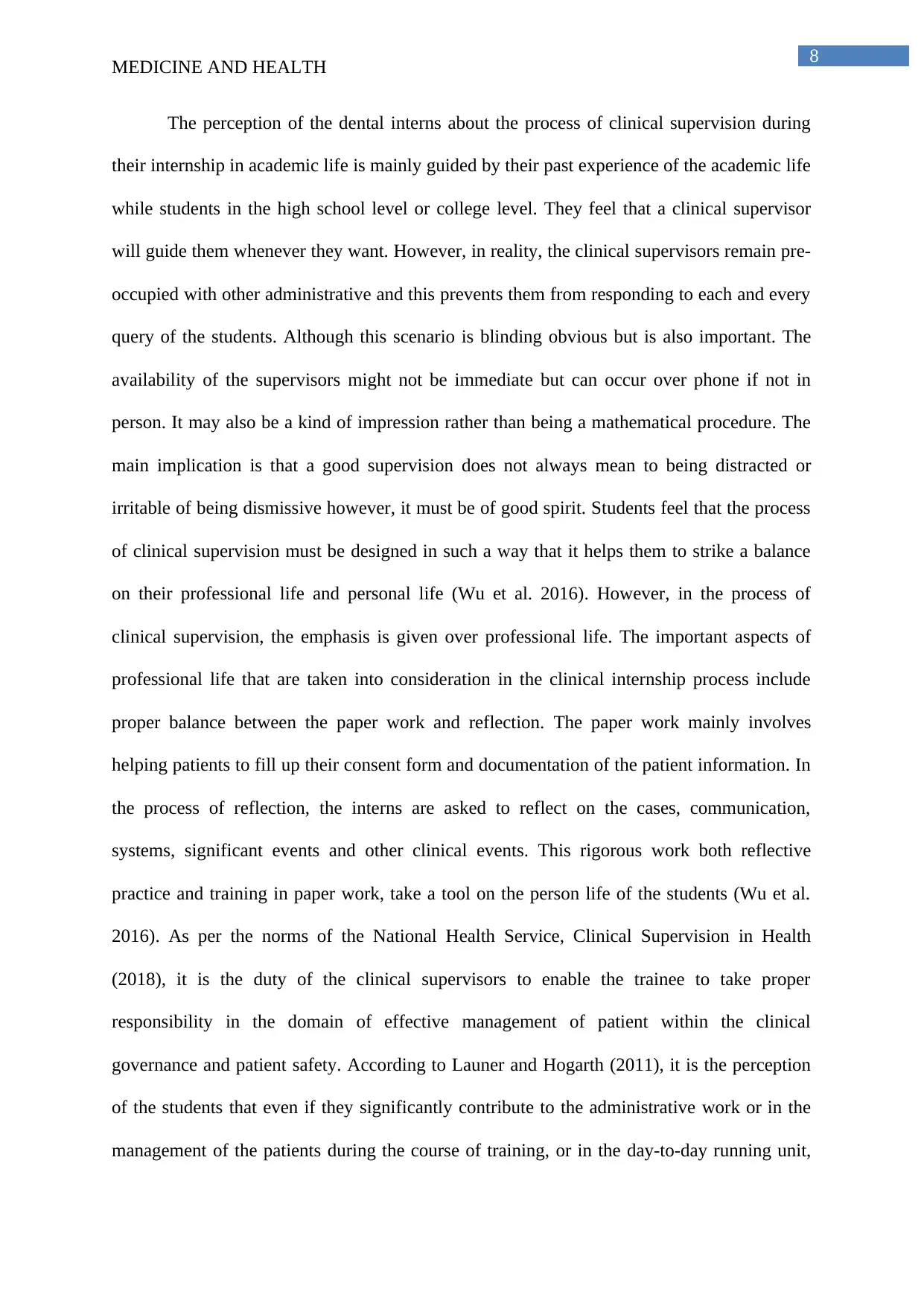
8
MEDICINE AND HEALTH
The perception of the dental interns about the process of clinical supervision during
their internship in academic life is mainly guided by their past experience of the academic life
while students in the high school level or college level. They feel that a clinical supervisor
will guide them whenever they want. However, in reality, the clinical supervisors remain pre-
occupied with other administrative and this prevents them from responding to each and every
query of the students. Although this scenario is blinding obvious but is also important. The
availability of the supervisors might not be immediate but can occur over phone if not in
person. It may also be a kind of impression rather than being a mathematical procedure. The
main implication is that a good supervision does not always mean to being distracted or
irritable of being dismissive however, it must be of good spirit. Students feel that the process
of clinical supervision must be designed in such a way that it helps them to strike a balance
on their professional life and personal life (Wu et al. 2016). However, in the process of
clinical supervision, the emphasis is given over professional life. The important aspects of
professional life that are taken into consideration in the clinical internship process include
proper balance between the paper work and reflection. The paper work mainly involves
helping patients to fill up their consent form and documentation of the patient information. In
the process of reflection, the interns are asked to reflect on the cases, communication,
systems, significant events and other clinical events. This rigorous work both reflective
practice and training in paper work, take a tool on the person life of the students (Wu et al.
2016). As per the norms of the National Health Service, Clinical Supervision in Health
(2018), it is the duty of the clinical supervisors to enable the trainee to take proper
responsibility in the domain of effective management of patient within the clinical
governance and patient safety. According to Launer and Hogarth (2011), it is the perception
of the students that even if they significantly contribute to the administrative work or in the
management of the patients during the course of training, or in the day-to-day running unit,
MEDICINE AND HEALTH
The perception of the dental interns about the process of clinical supervision during
their internship in academic life is mainly guided by their past experience of the academic life
while students in the high school level or college level. They feel that a clinical supervisor
will guide them whenever they want. However, in reality, the clinical supervisors remain pre-
occupied with other administrative and this prevents them from responding to each and every
query of the students. Although this scenario is blinding obvious but is also important. The
availability of the supervisors might not be immediate but can occur over phone if not in
person. It may also be a kind of impression rather than being a mathematical procedure. The
main implication is that a good supervision does not always mean to being distracted or
irritable of being dismissive however, it must be of good spirit. Students feel that the process
of clinical supervision must be designed in such a way that it helps them to strike a balance
on their professional life and personal life (Wu et al. 2016). However, in the process of
clinical supervision, the emphasis is given over professional life. The important aspects of
professional life that are taken into consideration in the clinical internship process include
proper balance between the paper work and reflection. The paper work mainly involves
helping patients to fill up their consent form and documentation of the patient information. In
the process of reflection, the interns are asked to reflect on the cases, communication,
systems, significant events and other clinical events. This rigorous work both reflective
practice and training in paper work, take a tool on the person life of the students (Wu et al.
2016). As per the norms of the National Health Service, Clinical Supervision in Health
(2018), it is the duty of the clinical supervisors to enable the trainee to take proper
responsibility in the domain of effective management of patient within the clinical
governance and patient safety. According to Launer and Hogarth (2011), it is the perception
of the students that even if they significantly contribute to the administrative work or in the
management of the patients during the course of training, or in the day-to-day running unit,

9
MEDICINE AND HEALTH
the supervisors do not recognise or acknowledges their initiatives. They are mainly
considered as an extra to the department and this act of division and lack of proper
acknowledgement creates lack of enthusiasm in the training process.
Apart from the negative though process about the overall clinical supervision, the
dental or the medical interns also nurture some positive perceptions about the importance of
the clinical supervision in their professional development (FalenderandShafranske2014). The
study conducted by Bifarin and Stonehouse (2017), over the dental interns highlighted that
the dental interns are hopeful towards the clinical supervision training. The majority of the
students are of the opinion that they are looking forward towards the internship as they are
hopeful that this will help them with hands on experience which in increase their
competencies in the overall practice standards. Effective feedback and hands of training help
them to excel on the critical decision making skills which serve immense importance during
their professional life.
Effective feedback in clinical supervision
Another component of observational learning depends on the symbolic representation
into actions. It had been already discussed earlier that feedback is an important aspect of the
teaching-learning process. The strong interpersonal relationship allows the dental or the
medical interns to get feedbacks from the supervisors (Bahn 2012). According to Prasad et
al. (2013), feedback provided by the supervisors to the dental interns can be helpful to
understand the gaps left in the learning process and the expected competence of the trainee.
As per the educational supervision of in health education of North West of the United States,
providing regular feedbacks according to the stage, level and performance of the training is
an important aspect of clinical internship process. It helps to increase the overall competence
of trainees. Numerous dental interns have highlighted that it is important for a clinical
supervision to be honest with the students and provide constant yet constructive feedback for
MEDICINE AND HEALTH
the supervisors do not recognise or acknowledges their initiatives. They are mainly
considered as an extra to the department and this act of division and lack of proper
acknowledgement creates lack of enthusiasm in the training process.
Apart from the negative though process about the overall clinical supervision, the
dental or the medical interns also nurture some positive perceptions about the importance of
the clinical supervision in their professional development (FalenderandShafranske2014). The
study conducted by Bifarin and Stonehouse (2017), over the dental interns highlighted that
the dental interns are hopeful towards the clinical supervision training. The majority of the
students are of the opinion that they are looking forward towards the internship as they are
hopeful that this will help them with hands on experience which in increase their
competencies in the overall practice standards. Effective feedback and hands of training help
them to excel on the critical decision making skills which serve immense importance during
their professional life.
Effective feedback in clinical supervision
Another component of observational learning depends on the symbolic representation
into actions. It had been already discussed earlier that feedback is an important aspect of the
teaching-learning process. The strong interpersonal relationship allows the dental or the
medical interns to get feedbacks from the supervisors (Bahn 2012). According to Prasad et
al. (2013), feedback provided by the supervisors to the dental interns can be helpful to
understand the gaps left in the learning process and the expected competence of the trainee.
As per the educational supervision of in health education of North West of the United States,
providing regular feedbacks according to the stage, level and performance of the training is
an important aspect of clinical internship process. It helps to increase the overall competence
of trainees. Numerous dental interns have highlighted that it is important for a clinical
supervision to be honest with the students and provide constant yet constructive feedback for
Secure Best Marks with AI Grader
Need help grading? Try our AI Grader for instant feedback on your assignments.
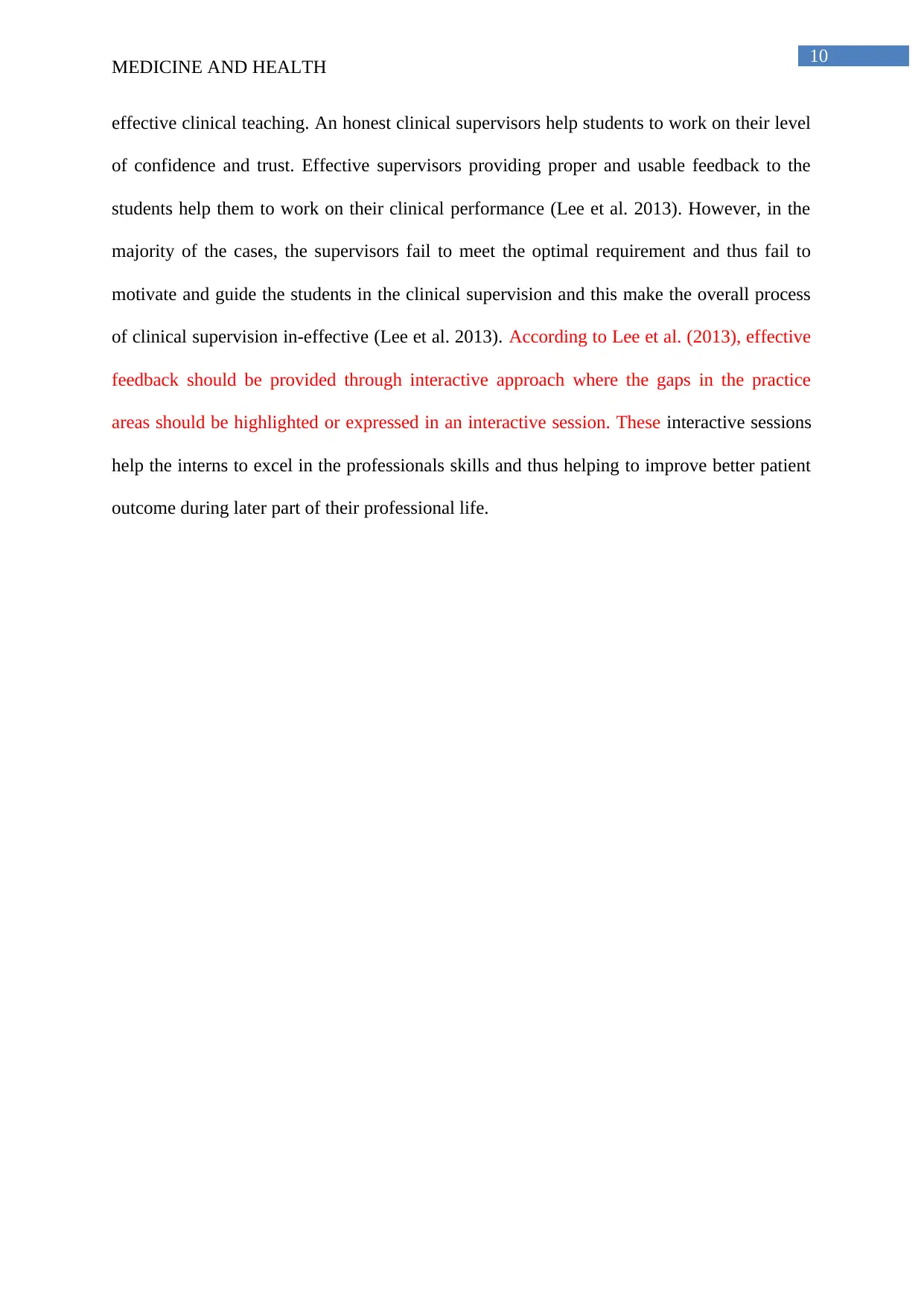
10
MEDICINE AND HEALTH
effective clinical teaching. An honest clinical supervisors help students to work on their level
of confidence and trust. Effective supervisors providing proper and usable feedback to the
students help them to work on their clinical performance (Lee et al. 2013). However, in the
majority of the cases, the supervisors fail to meet the optimal requirement and thus fail to
motivate and guide the students in the clinical supervision and this make the overall process
of clinical supervision in-effective (Lee et al. 2013). According to Lee et al. (2013), effective
feedback should be provided through interactive approach where the gaps in the practice
areas should be highlighted or expressed in an interactive session. These interactive sessions
help the interns to excel in the professionals skills and thus helping to improve better patient
outcome during later part of their professional life.
MEDICINE AND HEALTH
effective clinical teaching. An honest clinical supervisors help students to work on their level
of confidence and trust. Effective supervisors providing proper and usable feedback to the
students help them to work on their clinical performance (Lee et al. 2013). However, in the
majority of the cases, the supervisors fail to meet the optimal requirement and thus fail to
motivate and guide the students in the clinical supervision and this make the overall process
of clinical supervision in-effective (Lee et al. 2013). According to Lee et al. (2013), effective
feedback should be provided through interactive approach where the gaps in the practice
areas should be highlighted or expressed in an interactive session. These interactive sessions
help the interns to excel in the professionals skills and thus helping to improve better patient
outcome during later part of their professional life.
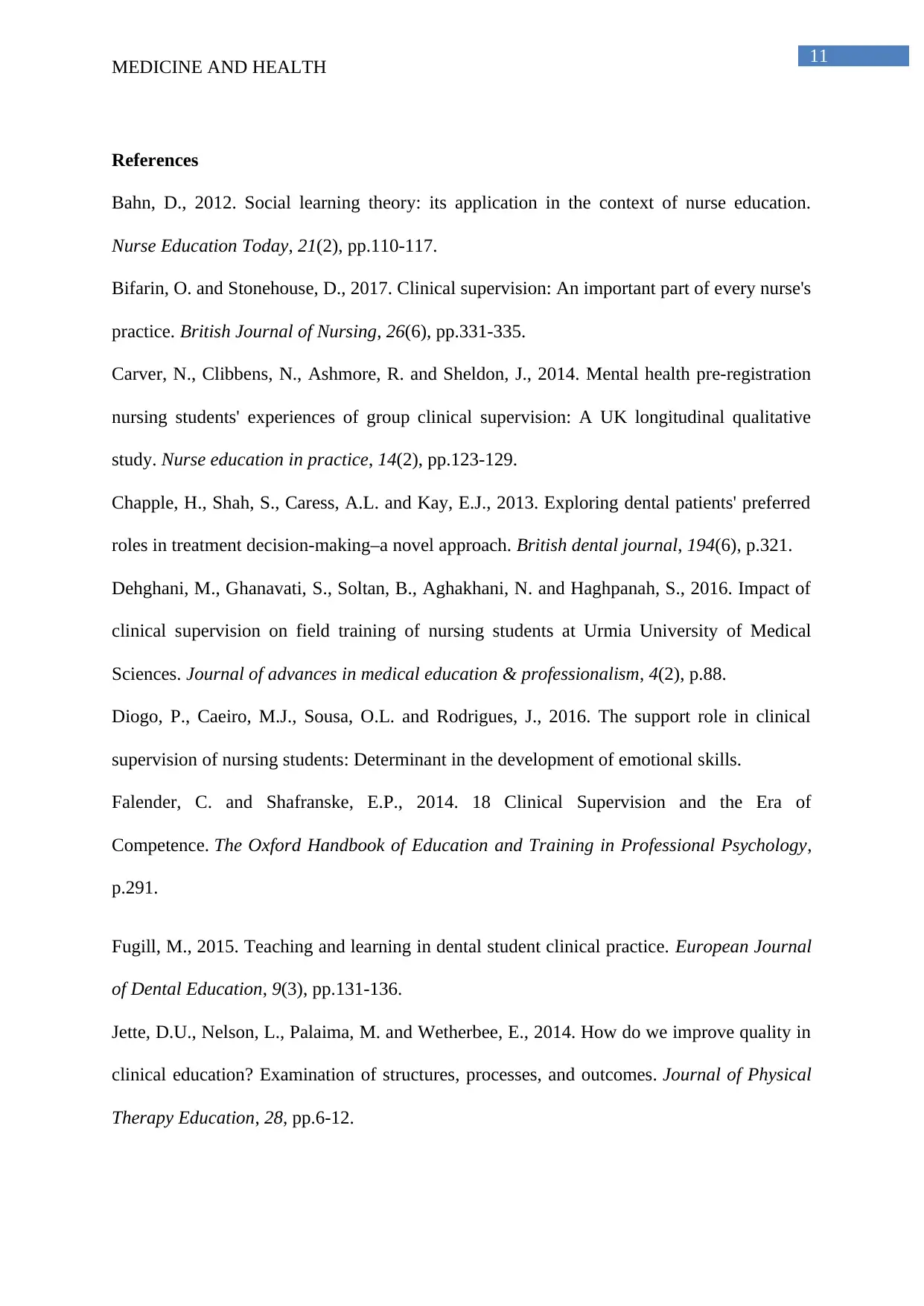
11
MEDICINE AND HEALTH
References
Bahn, D., 2012. Social learning theory: its application in the context of nurse education.
Nurse Education Today, 21(2), pp.110-117.
Bifarin, O. and Stonehouse, D., 2017. Clinical supervision: An important part of every nurse's
practice. British Journal of Nursing, 26(6), pp.331-335.
Carver, N., Clibbens, N., Ashmore, R. and Sheldon, J., 2014. Mental health pre-registration
nursing students' experiences of group clinical supervision: A UK longitudinal qualitative
study. Nurse education in practice, 14(2), pp.123-129.
Chapple, H., Shah, S., Caress, A.L. and Kay, E.J., 2013. Exploring dental patients' preferred
roles in treatment decision-making–a novel approach. British dental journal, 194(6), p.321.
Dehghani, M., Ghanavati, S., Soltan, B., Aghakhani, N. and Haghpanah, S., 2016. Impact of
clinical supervision on field training of nursing students at Urmia University of Medical
Sciences. Journal of advances in medical education & professionalism, 4(2), p.88.
Diogo, P., Caeiro, M.J., Sousa, O.L. and Rodrigues, J., 2016. The support role in clinical
supervision of nursing students: Determinant in the development of emotional skills.
Falender, C. and Shafranske, E.P., 2014. 18 Clinical Supervision and the Era of
Competence. The Oxford Handbook of Education and Training in Professional Psychology,
p.291.
Fugill, M., 2015. Teaching and learning in dental student clinical practice. European Journal
of Dental Education, 9(3), pp.131-136.
Jette, D.U., Nelson, L., Palaima, M. and Wetherbee, E., 2014. How do we improve quality in
clinical education? Examination of structures, processes, and outcomes. Journal of Physical
Therapy Education, 28, pp.6-12.
MEDICINE AND HEALTH
References
Bahn, D., 2012. Social learning theory: its application in the context of nurse education.
Nurse Education Today, 21(2), pp.110-117.
Bifarin, O. and Stonehouse, D., 2017. Clinical supervision: An important part of every nurse's
practice. British Journal of Nursing, 26(6), pp.331-335.
Carver, N., Clibbens, N., Ashmore, R. and Sheldon, J., 2014. Mental health pre-registration
nursing students' experiences of group clinical supervision: A UK longitudinal qualitative
study. Nurse education in practice, 14(2), pp.123-129.
Chapple, H., Shah, S., Caress, A.L. and Kay, E.J., 2013. Exploring dental patients' preferred
roles in treatment decision-making–a novel approach. British dental journal, 194(6), p.321.
Dehghani, M., Ghanavati, S., Soltan, B., Aghakhani, N. and Haghpanah, S., 2016. Impact of
clinical supervision on field training of nursing students at Urmia University of Medical
Sciences. Journal of advances in medical education & professionalism, 4(2), p.88.
Diogo, P., Caeiro, M.J., Sousa, O.L. and Rodrigues, J., 2016. The support role in clinical
supervision of nursing students: Determinant in the development of emotional skills.
Falender, C. and Shafranske, E.P., 2014. 18 Clinical Supervision and the Era of
Competence. The Oxford Handbook of Education and Training in Professional Psychology,
p.291.
Fugill, M., 2015. Teaching and learning in dental student clinical practice. European Journal
of Dental Education, 9(3), pp.131-136.
Jette, D.U., Nelson, L., Palaima, M. and Wetherbee, E., 2014. How do we improve quality in
clinical education? Examination of structures, processes, and outcomes. Journal of Physical
Therapy Education, 28, pp.6-12.

12
MEDICINE AND HEALTH
Kilminster, S.M. and Jolly, B.C., 2000. Effective supervision in clinical practice settings: a
literature review. Medical education, 34(10), pp.827-840.
Kristofferzon, M.L., Mårtensson, G., Mamhidir, A.G. and Löfmark, A., 2013. Nursing
students' perceptions of clinical supervision: The contributions of preceptors, head preceptors
and clinical lecturers. Nurse education today, 33(10), pp.1252-1257.
Launer, J. and Hogarth, S., 2011. What is good supervision?. Post Graduate Medical Journal
for Nursing. 87(1020), pp. 573-574.
Lee, K.T., Chen, C.M., Huang, S.T., Wu, Y.M., Lee, H.E., Hsu, K.J., Chen, H.S. and Wu,
J.H., 2013. Patient satisfaction with the quality of dental treatment provided by
interns. Journal of Dental Sciences, 8(2), pp.177-183.
National Health Clinical Supervision In Health Education North West. Access date: 12th
October 2018. Retrieved from: https://www.nwpgmd.nhs.uk/sites/default/files/ES%20in
%20HENW%20-%20Overview%202014.pdf
Okoronkwo, I.L., Onyia-Pat, J.L., Agbo, M.A.E., Okpala, P.U. and Ndu, A.C., 2013.
Students’ perception of effective clinical teaching and teacher behaviour. Open Journal of
Nursing, 3(01), p.63.
Prasad, K.D., Hegde, C., Alva, H. and Shetty, M., 2012. Medical and dental emergencies and
complications in dental practice and its management. Journal of Education and Ethics in
Dentistry, 2(1), p.13.
Stalmeijer, R.E., Dolmans, D.H., Wolfhagen, I.H. and Scherpbier, A.J., 2015. Cognitive
apprenticeship in clinical practice: can it stimulate learning in the opinion of
students?.Advances in health sciences education, 14(4), pp.535-546.
MEDICINE AND HEALTH
Kilminster, S.M. and Jolly, B.C., 2000. Effective supervision in clinical practice settings: a
literature review. Medical education, 34(10), pp.827-840.
Kristofferzon, M.L., Mårtensson, G., Mamhidir, A.G. and Löfmark, A., 2013. Nursing
students' perceptions of clinical supervision: The contributions of preceptors, head preceptors
and clinical lecturers. Nurse education today, 33(10), pp.1252-1257.
Launer, J. and Hogarth, S., 2011. What is good supervision?. Post Graduate Medical Journal
for Nursing. 87(1020), pp. 573-574.
Lee, K.T., Chen, C.M., Huang, S.T., Wu, Y.M., Lee, H.E., Hsu, K.J., Chen, H.S. and Wu,
J.H., 2013. Patient satisfaction with the quality of dental treatment provided by
interns. Journal of Dental Sciences, 8(2), pp.177-183.
National Health Clinical Supervision In Health Education North West. Access date: 12th
October 2018. Retrieved from: https://www.nwpgmd.nhs.uk/sites/default/files/ES%20in
%20HENW%20-%20Overview%202014.pdf
Okoronkwo, I.L., Onyia-Pat, J.L., Agbo, M.A.E., Okpala, P.U. and Ndu, A.C., 2013.
Students’ perception of effective clinical teaching and teacher behaviour. Open Journal of
Nursing, 3(01), p.63.
Prasad, K.D., Hegde, C., Alva, H. and Shetty, M., 2012. Medical and dental emergencies and
complications in dental practice and its management. Journal of Education and Ethics in
Dentistry, 2(1), p.13.
Stalmeijer, R.E., Dolmans, D.H., Wolfhagen, I.H. and Scherpbier, A.J., 2015. Cognitive
apprenticeship in clinical practice: can it stimulate learning in the opinion of
students?.Advances in health sciences education, 14(4), pp.535-546.
Paraphrase This Document
Need a fresh take? Get an instant paraphrase of this document with our AI Paraphraser
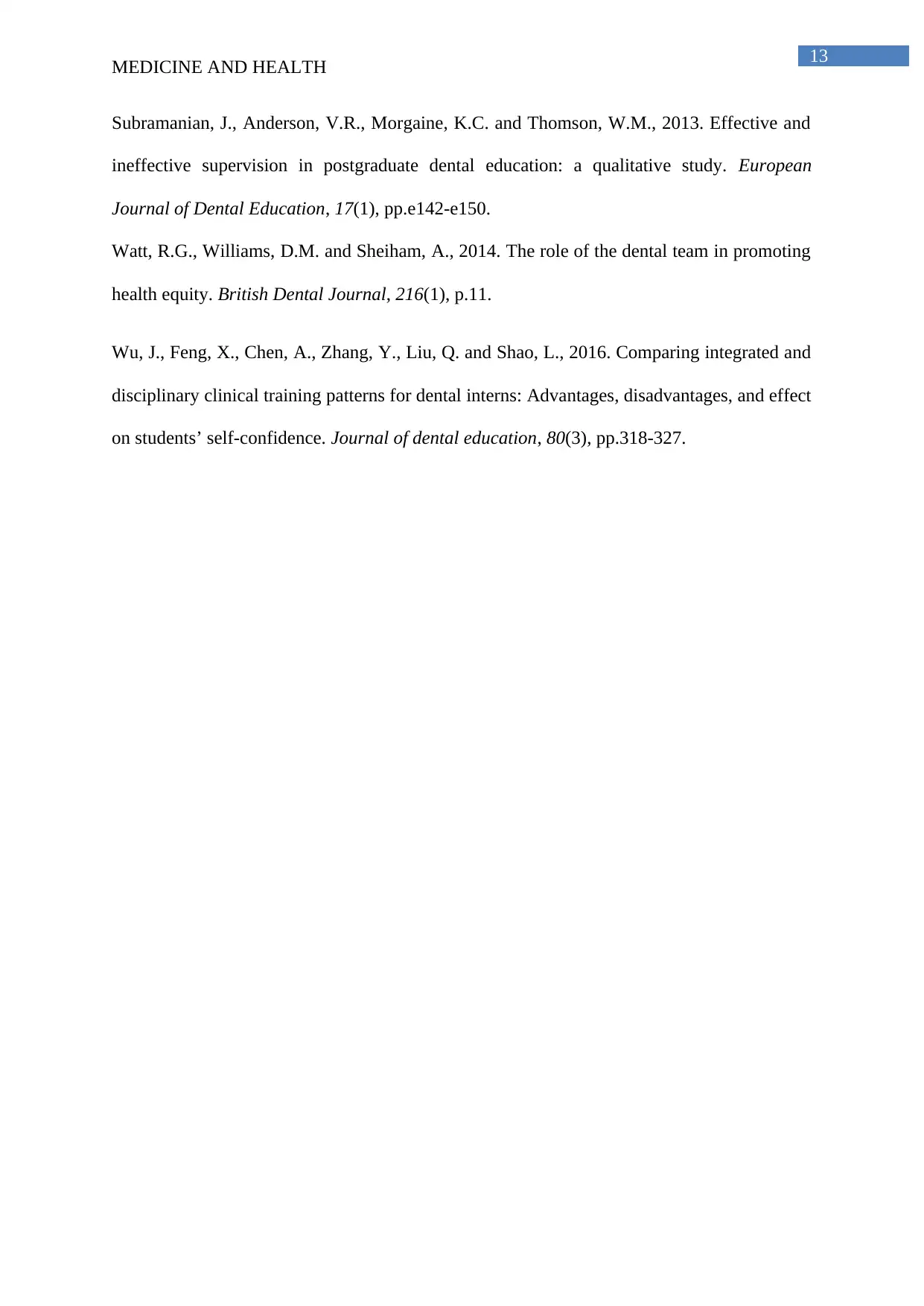
13
MEDICINE AND HEALTH
Subramanian, J., Anderson, V.R., Morgaine, K.C. and Thomson, W.M., 2013. Effective and
ineffective supervision in postgraduate dental education: a qualitative study. European
Journal of Dental Education, 17(1), pp.e142-e150.
Watt, R.G., Williams, D.M. and Sheiham, A., 2014. The role of the dental team in promoting
health equity. British Dental Journal, 216(1), p.11.
Wu, J., Feng, X., Chen, A., Zhang, Y., Liu, Q. and Shao, L., 2016. Comparing integrated and
disciplinary clinical training patterns for dental interns: Advantages, disadvantages, and effect
on students’ self-confidence. Journal of dental education, 80(3), pp.318-327.
MEDICINE AND HEALTH
Subramanian, J., Anderson, V.R., Morgaine, K.C. and Thomson, W.M., 2013. Effective and
ineffective supervision in postgraduate dental education: a qualitative study. European
Journal of Dental Education, 17(1), pp.e142-e150.
Watt, R.G., Williams, D.M. and Sheiham, A., 2014. The role of the dental team in promoting
health equity. British Dental Journal, 216(1), p.11.
Wu, J., Feng, X., Chen, A., Zhang, Y., Liu, Q. and Shao, L., 2016. Comparing integrated and
disciplinary clinical training patterns for dental interns: Advantages, disadvantages, and effect
on students’ self-confidence. Journal of dental education, 80(3), pp.318-327.
1 out of 14
Related Documents
Your All-in-One AI-Powered Toolkit for Academic Success.
+13062052269
info@desklib.com
Available 24*7 on WhatsApp / Email
![[object Object]](/_next/static/media/star-bottom.7253800d.svg)
Unlock your academic potential
© 2024 | Zucol Services PVT LTD | All rights reserved.





